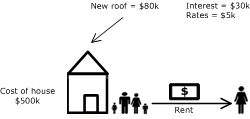Effectively means from 1st October 2015 tax is payable on any profit on the sale of residential property where the property has not been owned for two years.
There is and always has been a statute that allows the IRD to tax persons who buy and sell land with the purpose or intention of disposal later. Speculators are caught by existing legislation, which is section CB6(1) of the Income Tax Act 2007. However, the issue for the IRD has always been one of enforcement difficulty, and it is suggested that the Bright-line test will do away with this.
One of the issues with the new legislation is that whilst it may catch the speculators, who it is targeted against, it may well detrimentally affect local tax payers ie NZ tax payers who need to quickly sell a property within two years of purchase due to unforeseen personal circumstances.
There are exceptions to this bright-line test where the property is the seller’s main home, inherited from a deceased estate, or transferred as part of a relationship property settlement.
Capturing land transactions is to be done by way of requiring the investor to provide a New Zealand IRD number as part of the land transfer process. In addition, non-residents will need a New Zealand bank account number in order to be able to buy a property.
 A non-resident for the purpose of being issued with an IRD number will be defined as an “offshore person”. In essence this will be a person that is not a citizen or permanent resident.
A non-resident for the purpose of being issued with an IRD number will be defined as an “offshore person”. In essence this will be a person that is not a citizen or permanent resident.
These two requirements are now contained in the Taxation (Land Information and Offshore Persons Information) Bill 2015 (34-1) introduced on 22 June 2015. This information will be collected by conveyancers from property vendors and purchasers and provided to Land Information New Zealand which in turn will provide the information to Inland Revenue.
All non-resident buyers and sellers must also provide their Tax Identification Number from their home country along with current identification such as a passport. Primarily it is the obligation of lawyers to collect the information and prepare and file the Land Transfer Tax Statement, but vendors and purchasers need to be aware prior to entering into any residential property transaction that the required information will need to be provided.





